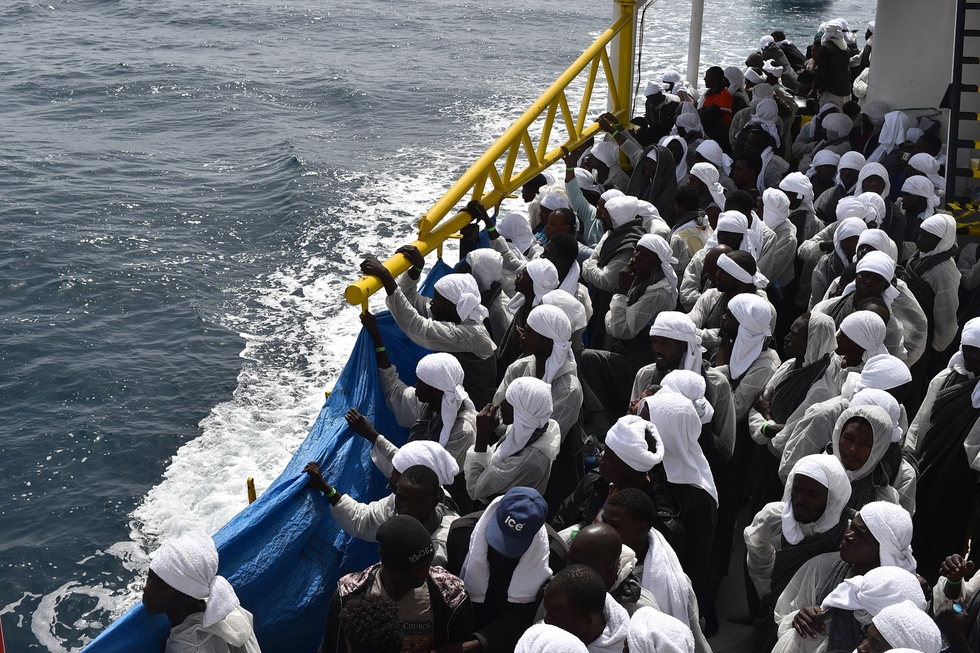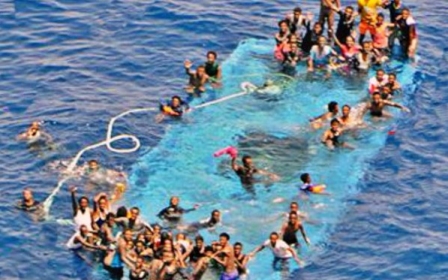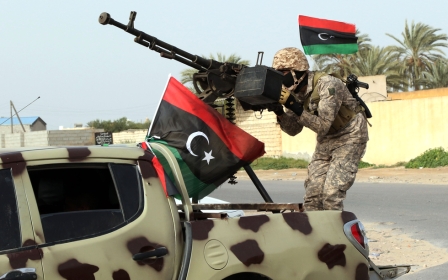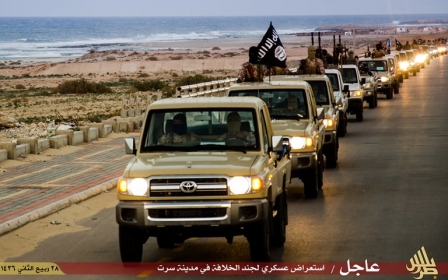UK prepares to send warship to tackle Libya refugee crisis

The British government is preparing to send a Royal Navy warship to the coast of Libya to lead new attempts to tackle people and weapon smuggling amid fears of a surge in refugee boats following the closure of the Turkish route into Europe.
Prime Minister David Cameron is expected to outline a new EU plan on Friday, and a government spokesman said late on Thursday that a formal request for help was imminently expected from the UN-backed Libyan unity government.
The plan comes in a week in which nearly 200 people have died in shipwrecks off the Libyan coast. On Thursday, 80 people were said to have drowned when a boat carrying hundreds foundered about 64km off Libya, while the toll from a sinking on Wednesday rose to 100 when rescuers said many had drowned in the hold of the capsized boat. Hundreds of others were rescued from the ships.
The new British deployment would be part of Operation Sophia, an EU mission that currently only operates in international waters. Pending a request from the Libyan government, the operation would be extended to the country's coastline.
Four British ships already involved in the operation are also expected to be used in Libyan waters. Access to the Libyan coast would allow for the interception of refugee boats, and destruction of the vessels at port.
The naval mission would also be used to prevent weapons shipments being smuggled to Islamic State (IS) militants operating in Libya.
Speaking from the G7 summit in Ise-Shima, Japan, the government spokesman said the new deployment, pending UN approval, would help “intercept boats off the coast, both those carrying migrants and those carrying arms”.
“We will now take an active leadership role in that process. Four military planners have deployed to Rome this week to the HQ of Operation Sophia, where they will work with other EU colleagues to agree a plan for the Libyan coastguard,” he said.
“Once the relevant UN security resolutions are in place, we intend to deploy a navy warship to the region to assist in the interception of arms and human smuggling.”
Up to 100 people feared drowned in Libya coast sinking
The suggestions come days after EU foreign ministers agreed to support Libya pending a UN security council resolution. Federica Mogherini, the EU foreign policy chief, said a plan would be put forward “in the coming days,” suggesting that a UN agreement was likely.
Libya has become the renewed focus of people-smuggling, with reports that refugees from Syria were again attempting to enter Europe via the Mediterranean following the EU-Turkey deal to send back any who had crossed the Aegean to Greece. Libya is also a crossing point for sub-Saharan African refugees and migrants.
Thousands of people have died in previous years attempting to cross from North Africa to Europe.
Libya's fragile new unity government, which has been unable to spread its authority beyond the capital Tripoli, has previously opposed allowing EU ships into its coastal waters for fear it would face accusations from within Libya that it was a puppet of the west.
Operating a Royal Navy vessel in Libyan waters would represent another step to direct British military involvement in Libya.
This week, British SAS soldiers were reported to be already operating against Islamic State militants in the country, despite earlier denials by ministers of "boots on the ground".
On Tuesday, Defence Secretary Michael Fallon told MPs that Britain was not planning “any kind of combat role,” and would approach parliament if plans changed.
“We’ve made it clear that we are not planning any kind of combat role either for our troops or for the RAF in Libya,” Michael Fallon told the House of Commons. “That is not part of our planning.”
New MEE newsletter: Jerusalem Dispatch
Sign up to get the latest insights and analysis on Israel-Palestine, alongside Turkey Unpacked and other MEE newsletters
Middle East Eye delivers independent and unrivalled coverage and analysis of the Middle East, North Africa and beyond. To learn more about republishing this content and the associated fees, please fill out this form. More about MEE can be found here.




